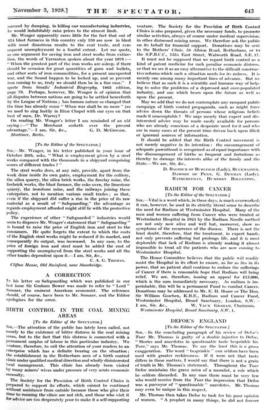[To the Editor of the SPECTATOR.]
Sin,:---Mr. Weager, hi his letter published in your issue of October 20th, asks, " What is employment given by a steel works compared with the thousands in a shipyard comprising scores of different trades ? "
The steel works does, at any rate, provide, apart from the work ikine inside its own gates, employment for the colliery, the"silica quarry, the silica brick works, the fireclay mine, the firebrick works, the blast furnace, the coke oven, the limestone quarrY, the ironstone mine, and the railways joining these enterprises, not to mention various small trades ; so that, even if the shipyard did suffer a rise in the price of its raw material as' a result of " Safeguarding," the advantage as regards employment afforded might still lie with the protective
policy.
The experience of other " Safeguarded " industries would seem to disprove Mr. Weager's statement that " Safeguarding " is bound to raise the price of English iron and steel to the consumers. He quite forgets the extent to which the costs of the English steel works might be reduced if its market, and consequently its output, was increased. In any case, to the price of foreign iron and steel must be added the cost of supporting the unemployed from the steel works and all the other trades dependent upon it.—I am, Sir, &c., C. A. G. THOMAS.
Clifton House, Old Swinford, near Stourbridge.


















































































































 Previous page
Previous page